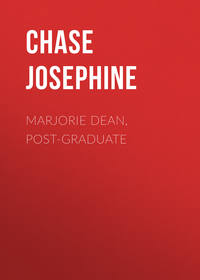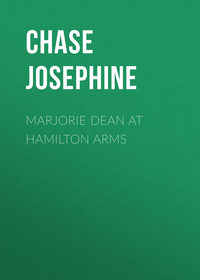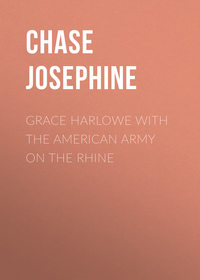 полная версия
полная версияMarjorie Dean, High School Sophomore
The mere fact that "The Rebellious Princess" was Lawrence Armitage's own composition served to spur her on to conquest. Given the leading rôle, she believed that she might awaken in the young man a distinct appreciation of herself which hitherto he had never demonstrated toward her. Once she had brought him to a tardy realization of her superiority over Constance Stevens, by outsinging the latter, along with all the other contestants, she was certain that admiration for herself as a singer would blot out any unpleasant impression he might earlier have conceived of her. She had heard that "the Stevens girl" could sing. It was to be doubted, however, if her voice amounted to much. Another point in her favor lay in the fact that Professor Harmon was a close friend of her father. He would surely give her the preference.
But while she dreamed of triumphantly holding the center of the stage before a spellbound audience, her rival to be, Constance Stevens, was seriously debating within herself regarding the wisdom of even entering the contest. Of a distinctly retiring nature, Constance was not eager to enter the lists. On the Friday afternoon before the try-out she was still undecided, and when the afternoon session of school was over, and she and the five girls with whom she spent most of her leisure hours were walking down the street, headed for Sargent's and its never-failing supply of sweets, she was curiously silent amid the gay chatter of her friends.
"I suppose you girls know that our dear Mignon has designs on the Princess," announced Jerry Macy, with the elaborate carelessness of one who gives forth important news as the commonest every-day matter.
"Mignon!" exclaimed Marjorie Dean in amazement. "I never even knew she could sing."
"She thinks she can," shrugged Muriel Harding. "Goodness knows she ought to. She has studied for ages. I'm surprised to hear that she is going to enter the try-out, considering it's Laurie's operetta. You know just how much he likes her. She knows, too."
"Who told you, Jerry?" quizzed Susan Atwell. "The way you gather news is positively marvelous. Was it big brother Hal?"
"No, he doesn't know it. If I told him, he'd tell Laurie and Laurie would promptly have a spasm. One of the girls in the senior class mentioned it to me."
"Mignon really sings well," put in Irma. "Don't you remember the time she sang at Muriel's party, two years ago? She has been studying ever since. She must have improved a good deal since then."
"Oh, I've heard her sing more than once," said Jerry Macy, "but I don't like her voice. It's – well, it isn't sweet and sympathetic."
"Neither is she," put in Susan with her customary giggle.
"Wait until Connie sings at the try-out. Then someone can gently lead Mignon to a back seat," predicted Jerry. "It would give me a good deal of pleasure to be that 'someone.'"
"I don't think I shall enter the try-out," remarked Constance, flushing.
"Why not?" was the questioning chorus.
"Oh, I don't know, only I just don't care to. If I do, someone might say that I went into it because – " She hesitated, and the flush on her cheeks deepened.
"Because you expected Laurie to choose you, you mean," finished Jerry.
"Yes; that is what I meant," admitted Constance. "Of course, I know there are other girls who are better singers than I, and that I couldn't possibly be chosen. Still, I'd rather not go into it at all, unless I could just be in the chorus."
"You are a goose; a nice, dear goose, but a goose, just the same," was Jerry's plain sentiment.
"Connie Stevens, if you don't try for that part, I'll never speak to you again," threatened Muriel.
"I'll disown you," added Susan in mock menace.
"Connie," Marjorie's voice vibrated with sudden energy, "I think you ought to try for the Princess. I am almost sure no other girl in Sanford High can sing so beautifully. Then there is Laurie. He has always been nice to you. It would hurt his feelings dreadfully if you didn't try for a part in his operetta. Besides, I know it sounds hateful, but I can't help saying that I'd be glad to see you take the Princess away from Mignon. That is, if she really stands a good chance of winning it. I suppose that is what Miss Archer would call 'an ignoble sentiment,' but I mean it, just the same." Marjorie glanced half defiantly around the bright-eyed circle. They were now in Sargent's, seated about their favorite table.
"Hurrah for you, Marjorie!" cried Jerry, flourishing her hand as though it were a pennant of triumph. "That's what I say, too. You are really a human, everyday person, after all. I used to think you were almost too forgiving toward certain persons, but now I can see that you aren't such a model forgiver, after all."
"That is rather a doubtful compliment, isn't it?" laughed Marjorie.
"Frankness is the soul of virtue," jeered Muriel.
"Oh, now, you know what I mean," protested Jerry, looking somewhat sheepish. "You girls do like to tease me. All right, I'll do the forgiving act and order the refreshments. I'll pay for them, too. I've a whole dollar. I am supposed to buy some stationery with it, but I'll just let my correspondence languish and treat instead. Name your eat and you can have it. Fifteen cents apiece is your limit. I need the other ten to buy stamps."
"What is the use in buying stamps if you don't intend to correspond?" put in Irma mischievously.
"I might need them some day," was Jerry's calm retort. "Besides, if I don't spend the ten cents I may lose it. Now the bureau of information is closed. Order your fifteen cents' worth!"
After changing their minds several times in rapid succession to the infinite disgust of the waitress, the sextette finally made unanimous decision for a new concoction in the way of a fruit lemonade, known as Sargent Nectar.
"Now," announced Jerry, as the long-suffering waitress deposited the tall glasses on the table and retired to the back of the room to grumble uncomplimentary comments to a fellow-worker on the ways of high school girls who didn't know their own minds, "let us all drink a toast to Miss Connie Stevens, the celebrated star of 'The Rebellious Princess.' But remember, we can't drink it until the star says she will shine.
"'Twinkle, twinkle, little star,Shall we see you from afar?On the Sanford stage so shy,For the fame of Sanford High.'"Who says I'm not a poet?"
"Connie, you can't resist that poetic appeal," giggled Susan.
Constance's blue eyes shone misty affection upon the circle of fresh, young faces, alight with the honest desire for her success. Her voice trembled a little as she said: "I'll take it all back, girls. Now that I know just how you feel about the try-out, I'd be an ungrateful girl to say I wouldn't do my best. I'll sing to-morrow, but if I'm not chosen, please don't be disappointed."
"To Connie, our Princess! Long may she warble!" Jerry raised her glass of lemonade. "Drink her down!"
CHAPTER XXIV
THE MOMENT OF TRIUMPH
It was a buzzing and excited assemblage of young men and women that gathered in the gymnasium of Weston High School on Saturday morning for the much-discussed try-out. As it had been strictly enjoined upon the students of both high schools that unless they desired to take part in the coming operetta their presence was not requested, nor would it be permitted, on the momentous occasion, the great room was only comfortably filled. Weston High School was represented by not more than twenty-five or thirty ambitious aspirants for fame, but at least a hundred girls from Sanford High cherished hopes of gaining admission to the magic cast. After much discussion, Marjorie and her four friends had decided to make a bold attempt at chorus celebrity, purely for the sake of seeing what happened. Constance had earnestly urged them to do so, declaring that she could not sing unless they were present to encourage her.
"I wonder if all this crowd expects to be chosen," was Jerry Macy's blunt comment, as the sextette of girls stood grouped at one side of the room, waiting for the affair to begin. "I hope I'm not asked to sing alone. Not so much for my own sake. I hate to make other people feel sad. I practised 'America' and 'Marching through Georgia' last night, just to see what I could do. One of our maids came rushing into the living room because she said she wondered who was making all that noise. Then Hal poked his head in the door and asked if I was hurt. So I quit. It was time."
Jerry's painful experience as a soloist provoked a burst of laughter from her friends. It had hardly died away when Professor Harmon, a stout, little man, with a shock of bushy hair and an expression of being always on the alert, bustled in. With him came Lawrence Armitage and a tall, dark-haired young man, a stranger to those present. The professor trotted to the piano, opened it, held a hurried conference with his companions, then, stepping forward, ran a searching eye over the assembled boys and girls. The more ambitious contestants of both sexes carried music rolls containing the selections they intended to offer, but the majority of that carefree congregation aspired to nothing higher than the chorus, looking upon the whole affair as a grand lark.
Professor Harmon proceeded to make a short speech, briefly outlining the plot of the opera and stating the nature of the try-out. "We shall ask those who wish to try for principals to step to that side of the room," he said, indicating the left. "I wish to hear them sing, first. Afterward, I shall select the chorus, and hear them sing together."
"That lets me out," was Jerry's relieved, inelegant comment to Susan Atwell, as she moved to the right. Susan stifled an irrepressible chuckle and sobered her face for what was to come.
Over among the groups of possible principals Constance became obsessed with sudden shyness. The majority of the girls were of the upper classes, and she felt lonely and ill at ease. She noted that she and Mignon La Salle were the only representatives of the sophomore class. Mignon, looking radiant self-possession in a smart old-rose suit and hat to match, carried herself with the air of one whose success was already assured. Her black eyes were snapping with excitement as they darted from the professor to the two young men standing beside the piano. She fingered her gray morocco music roll nervously, her thin fingers never still.
Stepping over to the piano the professor seated himself. "That young lady on the right, please come to the piano." The girl indicated, a dignified senior, obeyed the summons, coolly handed the professor her music, stationed herself at his side and awaited trial with the air of a Spartan. After a short prelude she began to sing a popular air that was at that time going the round of Sanford. She sang one verse, then the professor dropped his hands from the keys, inquired her name, made a memorandum on a pad, and, dismissing her, signaled another girl to take her place.
The try-out proceeded with a business-like snap that bade fair to end it with speedy commission. So far nothing startling in the way of voices had been discovered. Constance listened to the various girl soloists and wondered if she could do as well as they. Mignon leaned far forward with breathless interest. She was firmly convinced that her singing would create a sensation. When at last her turn came, she walked boldly forward. Professor Harmon smiled approval and encouragement. He desired particularly to see her carry off the honor of the leading rôle. She darted a lightning glance at Lawrence Armitage as she approached the piano, but in his impassive features she could read neither approval nor indifference.
She had chosen a French song, full of difficult runs and trills, and it may be set down here to her credit that she sang it well. As her clear, but somewhat unsympathetic voice rang out, a faint murmur of approbation swept the listeners. Her long training now stood her in good stead. Professor Harmon allowed her to go on with her song, instead of halting her in the middle of it, as he had in the case of the previous aspirants. When she had finished singing, she was greeted with a round of genuine applause, the first accorded to a singer since the beginning of the try-out. The brilliancy of her performance could not be denied, even by those who had reason to dislike her.
"Excellent, Miss La Salle," was Professor Harmon's tribute, as he handed her her music. Flushing with pride of achievement, the French girl returned to her place among the others, tingling with the sweetness of her success.
There now remained not more than half a dozen untried soloists. Constance Stevens was among that number. By this time Marjorie was becoming a trifle anxious. There was just a chance that Connie might be overlooked. Naturally retiring, she would be quite likely to make no sign, were Professor Harmon to pass her by, under the impression that she had already sung. But Marjorie's fears were needless. Constance had a staunch friend at court. During the try-out Lawrence Armitage's blue eyes had been frequently directed toward the quiet, fair-haired girl of his choice. Locked in his boyish heart was a secret knowledge that he had composed the operetta chiefly because he had wished Constance to have the opportunity of singing the part of the Princess. He had consented to the try-out merely to please Professor Harmon. He was convinced that no other girl could compare with Constance in the matter of voice. He was glad that she was to sing last, and a smile of proud expectation played about his mouth as Professor Harmon abruptly cut off an enterprising senior, the last contestant before Constance, in the midst of a high note.
The smile quickly faded to an expression of dismay as he saw the professor rise from the piano, his eyes on his memorandum pad. At the same instant a faint ripple of consternation was heard from a group of girls of which Marjorie formed the center. The latter took a hurried step forward. Marjorie was determined that Connie must not be cheated of her chance. She had caught a glimpse of Mignon, her black eyes blazing with insolent triumph and positive joy at the possibility of this unexpected elimination of the girl she hated.
But Marjorie's intended protest in behalf of her friend was never uttered. Laurie Armitage had come to the rescue. She saw him halt Professor Harmon, as he was about to address the company. She saw the little man's eyebrows elevate themselves in a glance toward Constance, following Laurie's low, energetic communication. Then she felt herself trembling with relief as Professor Harmon announced apologetically, "I understand that I almost made the mistake of overlooking one of Sanford's promising young singers. Will Miss Stevens please come forward?"
Pink with the embarrassment of the professor's words, Constance made no move to comply with the request. Good-natured Ellen Seymour, who was one of the contestants, pushed her gently forward. Ellen's light touch awoke Constance to motion. She walked mechanically toward the piano, as though propelled against her will by an unseen force. The humiliation of being even accidentally passed by looked forth from her sensitive features. Quick to note it, Lawrence Armitage advanced toward her, took her tightly rolled music from her hand, and, conducting her to the piano, introduced her to Professor Harmon, apparently unmindful of the many pairs of eyes intently watching the little scene.
"Now we are ready." The professor nodded to Constance, who stood with her small hands loosely clasped, her grave eyes fastened upon him. He half smiled, as his experienced fingers began the first soft notes of Mendelssohn's Spring Song. Long ago her foster father had written a set of exquisitely tender words that had exactly seemed to fit those unforgettable strains, so familiar to every true lover of music. Constance had sung them so many times that she knew them by heart. Now she fixed her eyes on the east wall of the gymnasium, and, leaving the world behind her, rendered the beautiful selection as though she were in her own home, with only her dear ones to listen to the flood of ravishing melody that issued from her white throat.
Marjorie Dean felt a swift rush of tears flood her brown eyes as she listened to her friend. She recalled the time when she had halted at the door of the little gray house, in wonder at that glorious voice. Conquering her emotion, she began to take stock of the effect of the song upon those assembled. She saw the proud flash of gladness that leaped to Laurie's fine face. His faith in Connie's powers was being amply fulfilled. She read the profound surprise and admiration of Professor Harmon, as he accompanied the singing girl. She glimpsed enthusiastic admiration in the countenances of the spell-bound students, many of whom had never before heard Constance sing. Then her gaze centered upon Mignon. Anger, surprise and chagrin swept the elfish face of the French girl. She read vocalization more flawless than her own, as well as greater sweetness and an intense sympathy, which she lacked, in the full, sweet, rounded tones that issued from her rival's lips. This was the voice of a great artist.
Professor Harmon turned from the piano as the last golden note died away and held out his hand. "Allow me to congratulate you, Miss Stevens. You – " His voice was drowned in tumult of noisy and fervent approbation on the part of the delighted audience. Boys and girls forgot the dignity of the occasion, and the next instant the surprised Constance found herself surrounded by as admiring a throng as ever did honor to a triumphant basket-ball or football star. If signs were true presagers of victory, if the united acclamation of the majority counted, then Constance Stevens had, indeed, come into her own.
CHAPTER XXV
AN UNHAPPY PRINCESS
It took Professor Harmon several minutes to reduce the noisy enthusiasts to the decorous state of order in which they had entered the gymnasium. Far from being elated over her triumph, Constance Stevens received the ovation with the shyness of a child brought before an audience against its will to speak its first piece. She heaved an audible sigh of relief when at last she was left to herself and retired behind Marjorie and her friends with a flushed, embarrassed face.
The boys' try-out was shortened considerably by the fact that there were fewer singers to be heard. When it was over it was announced that Hal Macy had carried off the rôle of the poor, neglected son, which was in reality the male lead. The Crane was selected for the king, while freckle-faced Daniel Seabrooke was chosen for the jester, greatly to his delight and surprise. There was an emphatic round of applause when Professor Harmon announced that Constance Stevens had been selected to sing the Princess. Ellen Seymour captured the rôle of the queen, and to Mignon La Salle was allotted the part of the disagreeable step-sister. It was second in importance to that of the Princess, but the French girl's face was a study as she received the announcement. She tried to smile, but the baffled anger and keen disappointment which was hers blazed forth from her elfish eyes. The minor parts were soon given out, and then came the trial of the chorus.
The hope of Marjorie and her four friends that they might be chosen was fulfilled. A number of the girls who had sung solos were also selected, and, with one or two disgruntled exceptions, resigned themselves to the lesser glory, gratefully accepting what was offered them. It was evident, however, that pretty faces had much to do with the Professor's choice of the chorus, and when he had gathered the elect together and heard them sing "The Star Spangled Banner" as a test, he expressed himself as satisfied, and appointed a rehearsal for the following Tuesday afternoon at four o'clock.
With the exception of Constance, it was a most jubilant sextette that set out for Sargent's, at Marjorie's invitation, after the try-out was over. She was still somewhat dazed over her success. Although she smiled as the five girls paid her affectionate tribute, she had little to say.
"Girls, did you see Mignon's face when Connie was singing?" began Muriel Harding, as soon as they were out of earshot of any possible participants in the try-out.
"Did we see it? Well, I guess so." Jerry made prompt answer. "At least, I did. While Connie was singing I was dividing my seeing power between her and the fair but frowning Mignon. Maybe she wasn't mad! She tried to pretend she wasn't listening, but she never missed a note. She had sense enough to know good singing when she heard it."
"I was watching her, too," nodded Muriel Harding. "Her eyes positively glittered when Professor Harmon almost missed hearing Connie sing. I knew she was hoping he would. Then Laurie Armitage came to the rescue."
"I was going to say something," was Marjorie's quiet comment. "I had made up my mind that Connie shouldn't be overlooked. I was so glad when Laurie spoke to the professor."
"I thought you were," declared Jerry. "I was going to say something, if no one else did."
"I don't believe any one of us could have stood there and seen Connie miss her turn without making a fuss," said gentle Irma Linton. "I am so glad it all came out nicely. Laurie Armitage is a splendid boy."
"So is the Crane," put in Jerry slyly.
"Of course he is," agreed Irma, placidly ignoring Jerry's attempt to tease. "So is your brother Hal. There are lots of nice boys in Weston High."
Jerry merely grinned cheerfully at this retort and returned to the subject of the coming opera. "Is Laurie going to help you with your songs?" she asked, addressing Constance.
"Yes," replied Constance simply. "He said he would. I can't quite believe yet that I am to sing the Princess. I may be able to manage the songs, but I can't act. I imagine Mignon would make a better actress than I."
"She ought to," jeered Muriel Harding, who could never resist a thrust at the French girl. "She never does anything else. I don't believe she'd know her real self if she came face to face with it in broad daylight."
"Oh, forget Mignon. Who was that tall, dark man with Laurie and Professor Harmon?" interposed Susan Atwell. "You ought to know, Connie. I saw Laurie introduce you to him."
"His name is Atwell," answered Constance. "He is an actor, I believe. I don't know why he happened to be at the try-out to-day. Perhaps Professor Harmon invited him."
"I'll find out all about him and tell you," volunteered Jerry. "Hal may know. If he doesn't, some one else will."
"For further information, ask brother Hal," giggled Susan.
It was not until Marjorie and Constance had said good-bye to the others and were strolling home in the spring sunshine that the latter asked, "Where was Mary to-day?"
"I don't know." Marjorie spoke soberly. "She left the house before I did this morning. She said last night that she wasn't interested in the try-out. I thought perhaps she might like to be in the chorus, but she doesn't appear to care about it. She has a sweet, soprano voice and can sing well."
"I am sorry," was Constance's brief answer.
"So am I." Marjorie did not continue the painful subject. They had talked it over so many times, there was nothing left to be said. "I am glad you were chosen for the Princess," she said after a little silence, during which the two girls were busy with their own thoughts.
"I am going to try to sing well, if only to please you and Laurie," was Constance's earnest avowal.
"I'm glad Mignon didn't get the part. It won't be very pleasant for you to have to sing with her. I wouldn't say this to anyone else, but if I were you I would keep a watchful eye on her, Connie."
"If she tries to be disagreeable, I shall simply pay no attention to her."
"That will be best," nodded Marjorie. Nevertheless, she reflected that as a member of the chorus she would have opportunity to observe the French girl and mentally decided to keep an eye on her.
"Has Mary come in, Delia?" was Marjorie's quick question, as the maid answered her ring.
"Here I am," called Mary from the living room. She had heard Marjorie's question. Now she appeared in the doorway of the living room, viewing her former chum with sombre gravity. "Who is going to sing the Princess?" she asked abruptly.
"Connie was chosen. She sang beautifully."
"I'm glad Mignon didn't get the part," muttered Mary. Wheeling about, she walked into the living room, and, taking up a book she had turned face downward on the table, became, to all appearances, absorbed in its pages.









